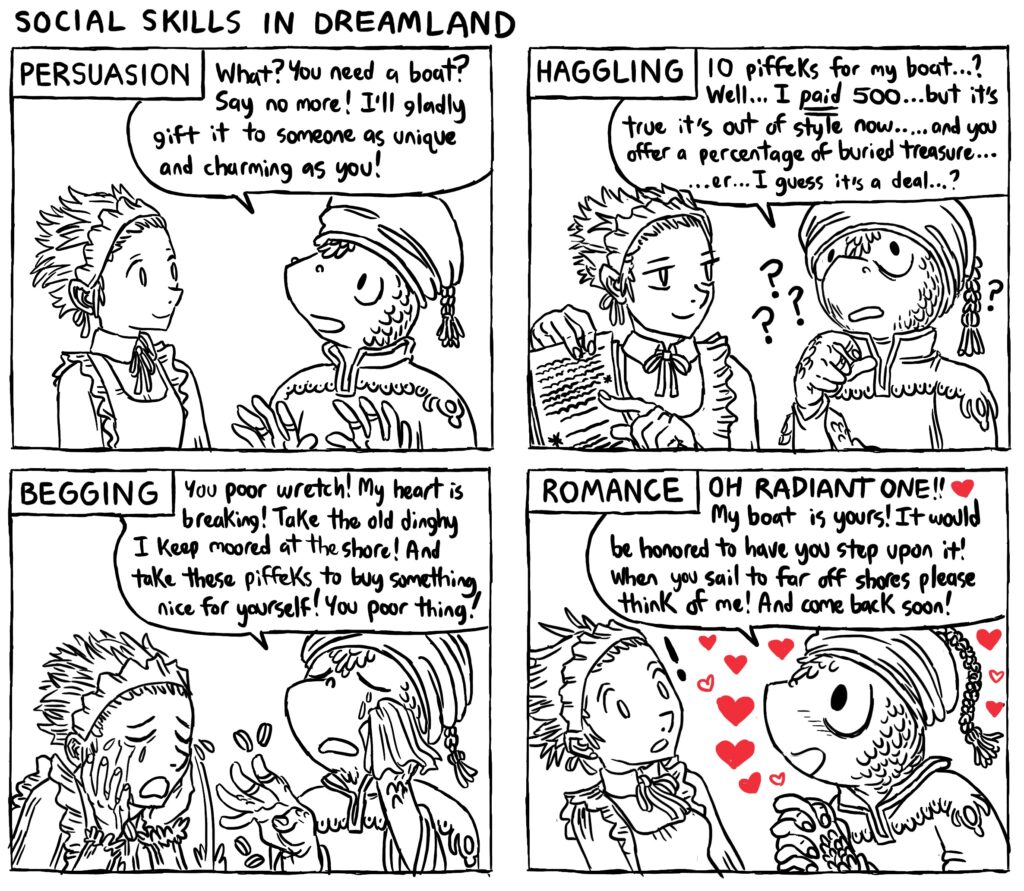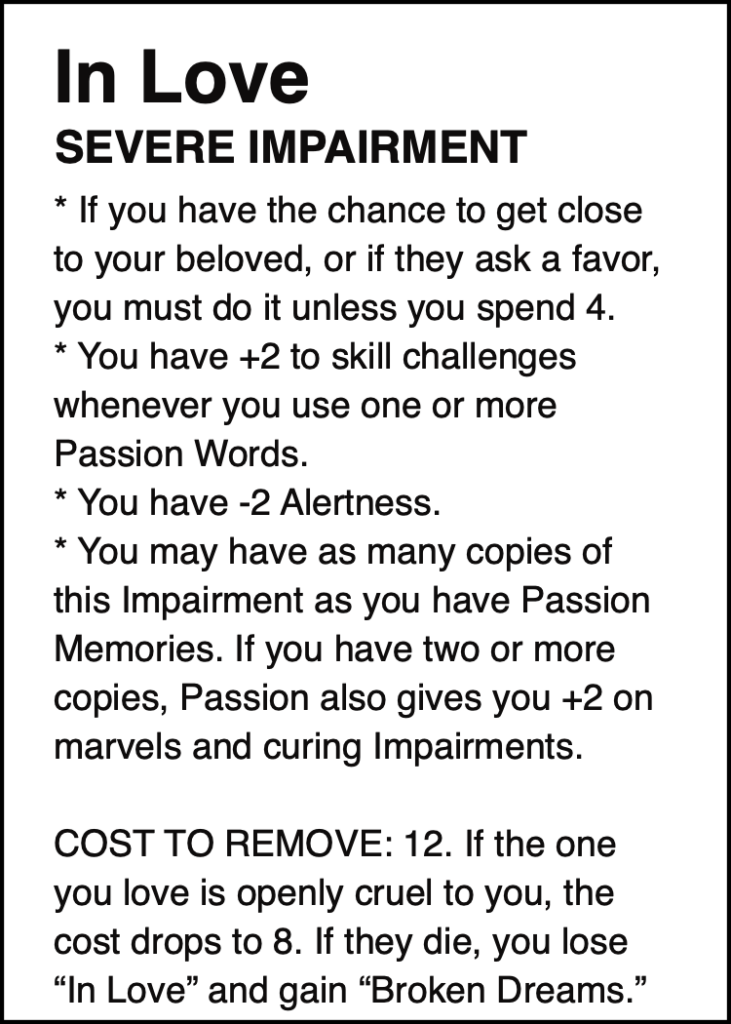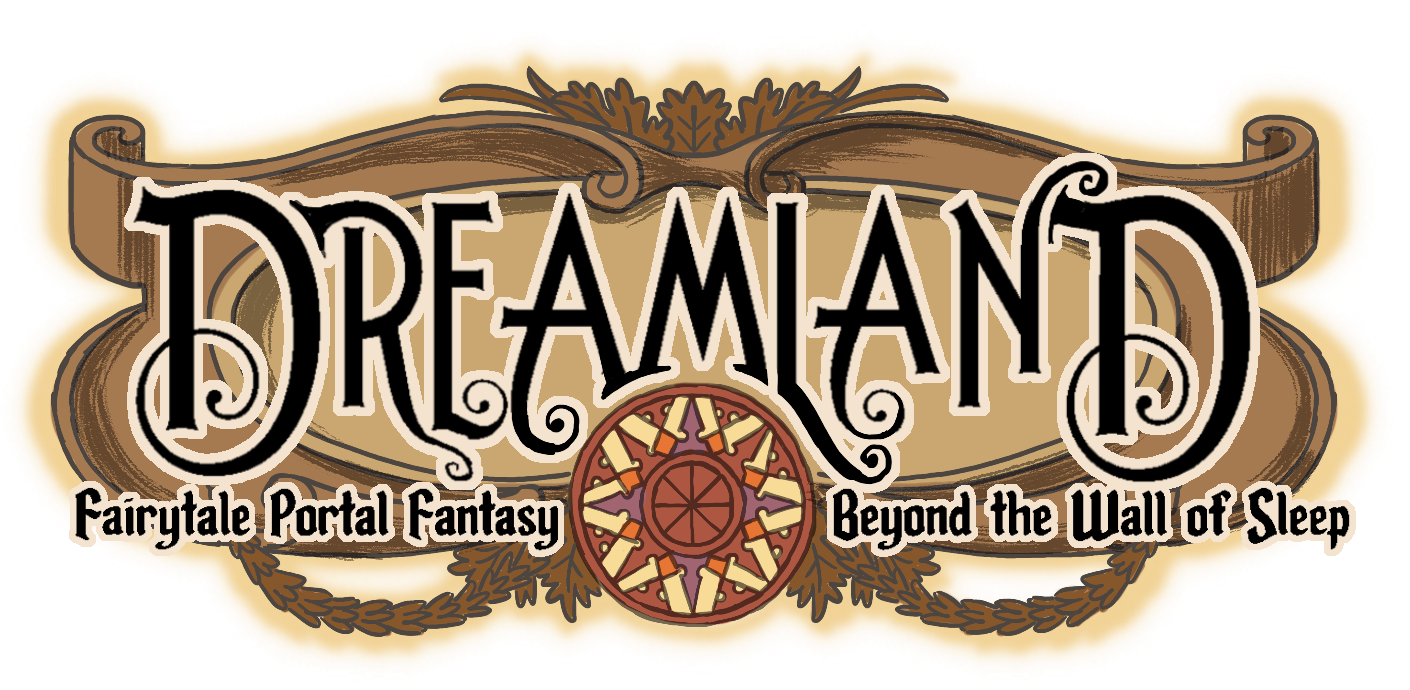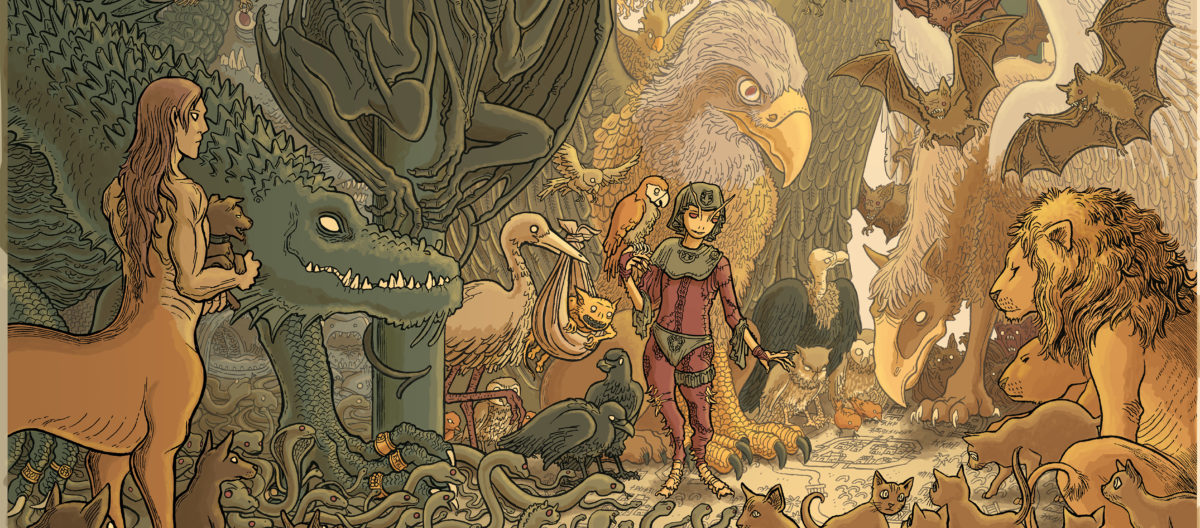
Happy Valentine’s Day! In honor of the holiday, here’s a post about the rules related to love & romance in Dreamland. If you want something to have a place of honor in a game, you need rules for it, and Dreamland was never intended to be a game with just 30+ pages of combat rules. Here’s how Dreamland characters (and players) might get involved with love stories, whether as the object of affection, the one in love, or both. Next post, dragons!!
Romance as a Skill
Many a small-town Dreamlander secretly dreams of being swept off their feet by a beautiful foreigner, and many a traveler is tempted to spend a lifetime or a night with the lovely strangers of the towns they pass. Some poets and courtesans think of love as an art, and fill countless scrolls with love advice, stories, songs, poems and diagrams. But other people, with no thought of finding lovers or being attractive, have an innate quality of beauty or lovability that leaves people around them smitten.
Romance is a risky challenge against the target’s Stubbornness+3 (thus, 4+1D6 for a typical human Dreamlander). If a player doesn’t like the idea of “seducing” an NPC, they can instead think of Romance as a player-controlled narrative device. In this case, rather than the dreamer trying to win the heart of an NPC, their Romance simply represents the natural attractive qualities that cause others to fall in love with them. The dreamer may not expect to be in a love story, but out of character, the player chooses when and with whom it happens.
Romance only works on individuals, not groups. An NPC falling in love with a dreamer doesn’t improve the attitude of their fellows, although the individual will do their best to stand up for the object of their adoration. However, just because someone loves you doesn’t mean they necessarily do everything you ask, and their ideas of proper relationship behavior will be strongly influenced by their culture.
Making someone fall out of love with you is harder than Romance, and might require multiple risky Persuasion challenges, at the DM’s discretion.
As with all social skills, dreamers can’t use Romance on one another unless the players agree to it out of character.
On Being In Love
If someone is in love with you, it doesn’t necessarily mean you are in love with them. In rules terms, to “truly” fall in love with someone in Dreamland, a dreamer must spend a Passion half-Memory: dreamers without Passion might feel strong affection, but they don’t get the rules benefits (and drawbacks) of being “In Love”. You can spend a Passion half-Memory in this way anytime you are in the presence of, or have learned about, someone you might fall in love with. Within the world of Dreamland, of course, you don’t choose with whom you fall in love, but out of character, the player can choose when and with whom it happens.

Being In Love isn’t “really” an Impairment, of course, but it does make life more complicated. A dreamer who is In Love has -2 Alertness, has a bonus +2 to any skill challenge in which they spend one or more Passion Words, and may occasionally have to spend 4 Words to resist seeking out their beloved or doing what their beloved wants. Normally a dreamer can only be truly In Love with one person at a time. However, if you have 2 or 3 Passion Memories (including half-forgotten ones), you are so passionate you can be simultaneously in love with two or three people. Alternately, you can choose to become doubly or triply in love with the same person, though if this happens, the number of Words you must spend to spurn or leave your beloved also stacks, to 8 or 12. If you are doubly or triply in love, Passion Words also give you +2 on creating marvels and curing Impairments. In either case, if you lose a Passion Memory (not just a half-Memory), you either become slightly less in love with your one true love, or you fall out of love with one of your paramours, your choice which.
True love is pure and asks for nothing in return from its object; your bonuses for being In Love take effect regardless of whether your beloved is physically present or returns your feelings. However, the DM may periodically require you to spend 4 Words not to drop everything and rush immediately to your beloved’s side.
If the person you love dies, you lose the In Love Impairment (or plural Impairments if you were doubly or triply in love with them) and gain the Dream Shock Impairment, Broken Dreams. If Broken Dreams brings you to three or more Dream Shock Impairments, the shock knocks you out of Dreamland, and you can never return (see “If You Cease Being a Dreamer,” later in this chapter). If you are in love with two or three people, you don’t gain Broken Dreams unless they all die. If just one of them dies, you become Spellbound, either with mourning the dead person or with avenging their death (your choice).
In addition to willingly (out of character) falling In Love, dreamers might sometimes unexpectedly fall In Love by breaking the Pillar of Passion. (This is the only way character without Passion Memories can fall In Love.) However, the DM should get out-of-character consent from the player—ideally both at the beginning of the game and in the moment—before having such a thing happen, as described below.
Love Stories and Players’ Boundaries
Love adds a classic fairy-tale trope to Dreamland and can counterbalance the horrific forces of Loathing. However, some players aren’t comfortable roleplaying love scenes, and such material needs to be handled delicately. Emily Allen’s “Dungeon Bitches” and many other games have extensively written about how to handle such material: this is my own take on it.
Before a campaign or a one-shot game, the DM should check which players are or aren’t comfortable roleplaying being in love (and thus getting the In Love Impairment). A good way to do this is by asking all the players to close their eyes, and then asking them to raise a hand if they are comfortable roleplaying being in love. This way, no player is forced to roleplay being In Love if they don’t want to, and the players also don’t have to reveal their preferences in front of the others. Of course, just because a player consents to roleplaying love scenes doesn’t mean they consent to sex scenes—that’s an entirely different conversation!
Being unable to make a particular dreamer fall in love by breaking the Pillar of Passion may seem to give that player an advantage, but of course, the DM has plenty of other options to challenge and torment them. If a player who opted out of love stories changes their mind in the course of play and decides to spend a Passion half-Memory to fall In Love, let them do it. Some players may be okay with voluntarily falling in love when the circumstances are right, but less okay with having to roleplay being in love with a random stranger or seductive noble.
Some evil entities can cause dreamers to become Spellbound, an Impairment which may take the form of overt mind control or may superficially resemble falling in love with the evil entity. If players aren’t comfortable falling In Love, they probably also aren’t comfortable being Spellbound in this way, and the DM should make sure that there is no romantic subtext to the Spellbound Impairment if it comes into play.

